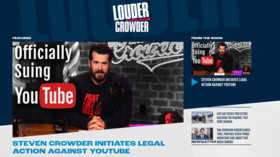Steven Crowder may win his fight with YouTube… but it won’t be a turning point for censored conservatives

Conservative comedian Steven Crowder is suing YouTube for removing his videos. He may have a credible case, but until Section 230 protection is removed, the outcome is unlikely to help others on the right who’ve been targeted.
Over the course of the last decade, Steven Crowder has become one of the biggest names in conservative media. Hosting one of the few shows anywhere that could be considered a conservative alternative to late night TV, Crowder’s main platform has been YouTube, as opposed to a major network. However, as time has passed, there have been more and more problems between Crowder and the platform.
Since making a big comeback this year after some health issues, Crowder has found himself with several strikes against his channel, based on the YouTube terms of service. Crowder himself is disputing YouTube’s claims, and his cases do appear to have some merit.
The first dispute was in regards to a video he did on election fraud. During the course of it he pointed out several voting discrepancies, but his video was flagged as spreading misleading information about the 2020 presidential election. However, he did not state in the video that he felt the election result needed to be overturned. The purpose of the video simply seemed to be to point out how the American voting system could be manipulated, which has been a major worry of many conservatives.
The second dispute – over a hard strike – was in regards to what YouTube claimed was misinformation about Covid-19 statistics. But there’s a problem with this claim, considering that the Crowder show was using CDC statistics and simply making observations about how the disease would affect young people as opposed to any other age group. Given that the CDC is a trusted source for most outlets, it is puzzling that Crowder would run into trouble here.
The third instance – another hard strike – is a claim that Crowder was mocking the death of Ma’Khia Bryant in Columbus, Ohio, which he states he did not do. He maintains that he was simply discussing the events that transpired when Bryant attempted to stab someone and was shot by a police officer in a bid to save the other party’s life.
Given that Crowder feels he is being treated unfairly, his lawyer Bill Richmond has begun the lawsuit process.
On a personal note, I do think that Crowder has had a bit of a raw deal. Throughout my own time on YouTube I have seen that conservative channels tend to get targeted. However, I do not believe that this particular case is going to be a game changer.
Even if the case goes to court and the judge finds in favor of Crowder, the decision made is unlikely to have any long-term repercussions for content creators. From what Richmond and Crowder said on the show when discussing the lawsuit, it seems that the debate is whether or not YouTube is targeting Crowder specifically. Were Crowder to achieve victory, I can’t imagine the judge’s decision would be a sweeping one with implications for all content creators on YouTube.
Ultimately, the real debate lies within the ‘publisher or platform’ discussion. As I wrote in December, Section 230 of the Communications Decency Act has offered protection to YouTube. It can declare certain content “harmful” and curate it with no consequence for violating people’s free speech. That shouldn’t be acceptable. I’m of the opinion that the only thing that is going to actually change this for the better is if Congress is able to pass legislation to remove these protections.
What I will say, though, is that Crowder is something of a canary in a coal mine here. What has happened to him suggests that certain platforms simply do not want content creators to be able to speak their mind if they’re conservative. This is frightening, and I wish I had the confidence that his case could have a wider-reaching effect. Nevertheless, I wish him well and hope he is successful.
Think your friends would be interested? Share this story!
The statements, views and opinions expressed in this column are solely those of the author and do not necessarily represent those of RT.

















